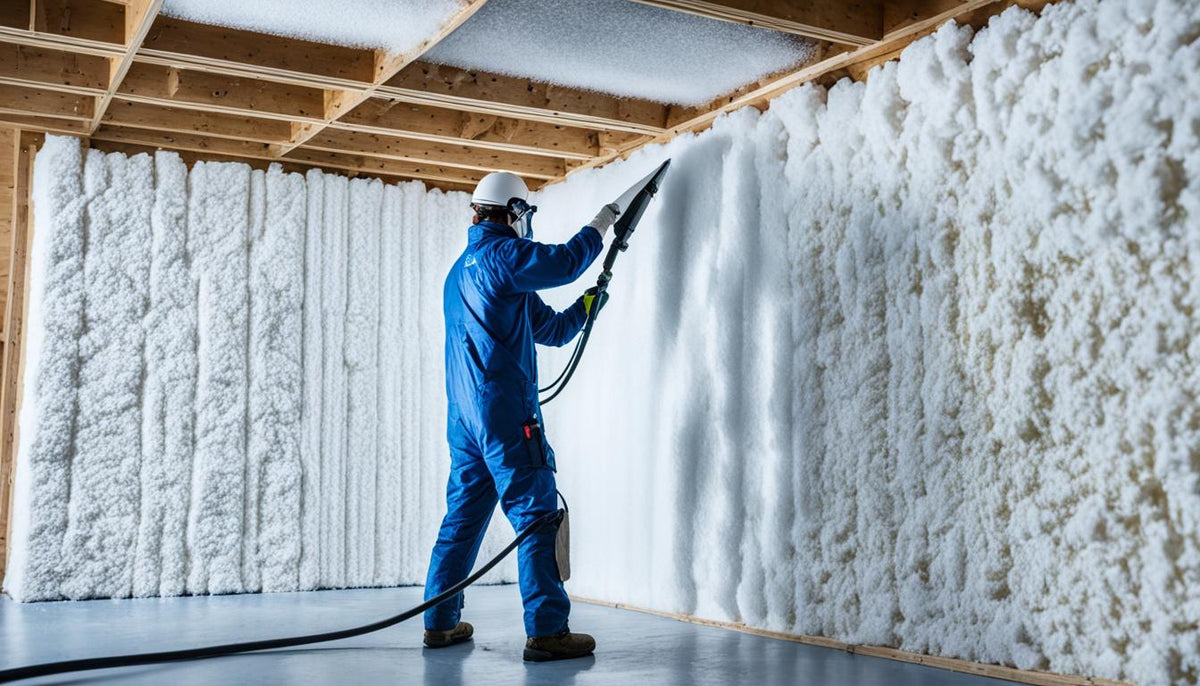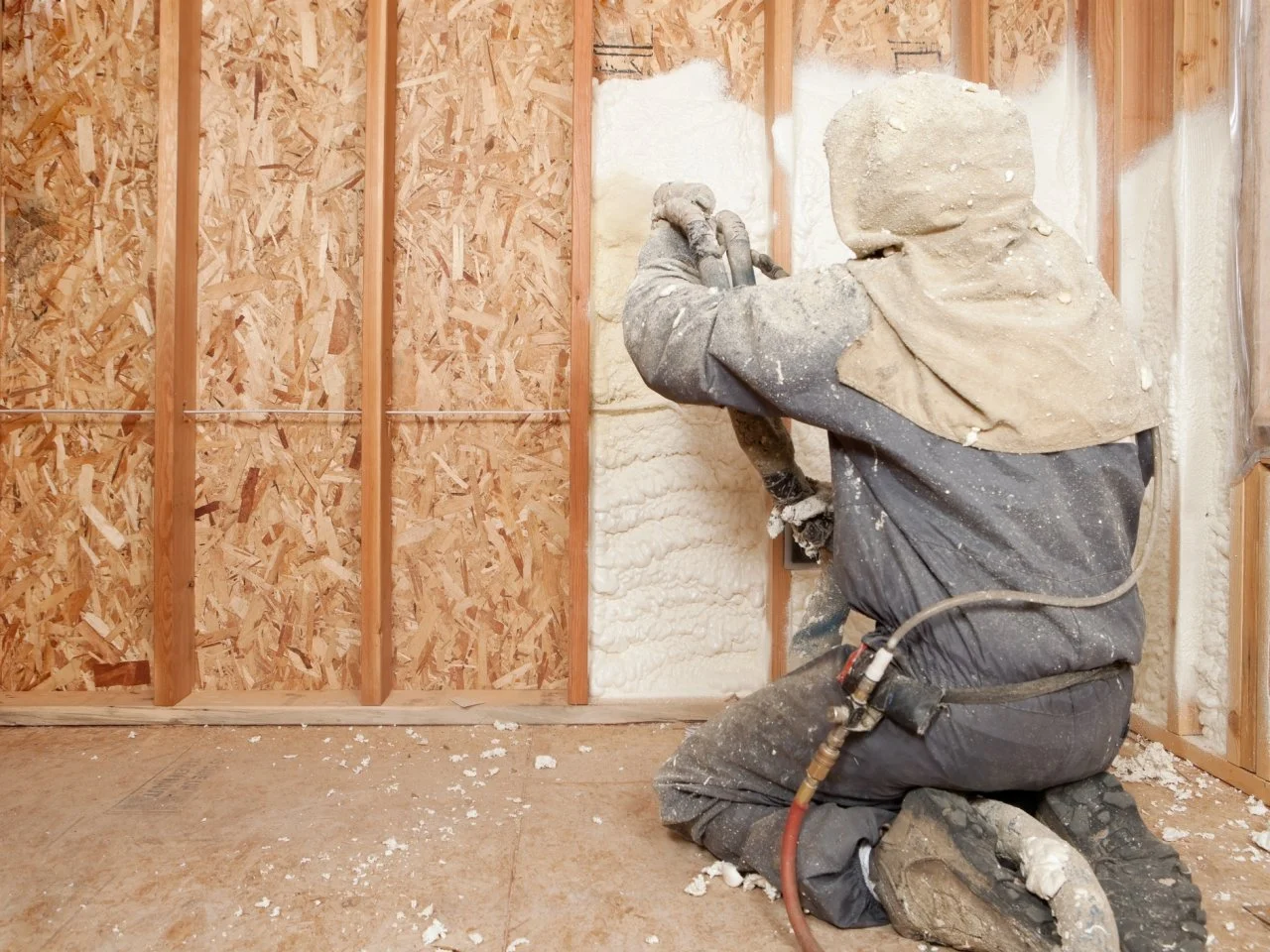Frequently Asked Questions Concerning Spray Foam Installation and Usage
Frequently Asked Questions Concerning Spray Foam Installation and Usage
Blog Article
Spray Foam: The Ultimate Service for Air Sealing and Insulation
Spray foam insulation has actually emerged as a leading service for reliable air sealing and thermal insulation, providing a distinct combination of homes that set it apart from typical methods. Recognizing the complete range of its benefits, installment procedures, and comparisons with various other insulation types is important for making informed choices.
What Is Spray Foam?
Spray foam is a flexible insulation material that incorporates the concepts of air securing and thermal resistance to improve energy performance in structures. Composed largely of polyurethane or various other comparable substances, spray foam is applied as a fluid that broadens upon contact with surface areas, creating a strong, continuous layer of insulation. This distinct property enables it to fill spaces, splits, and spaces that conventional insulation materials might neglect, providing a premium air seal.
There are two primary types of spray foam: open-cell and closed-cell. Open-cell spray foam is lighter and extra versatile, offering exceptional sound absorption and a reduced R-value per inch - Spray Foam. In contrast, closed-cell spray foam is denser, offering a higher R-value, dampness resistance, and added architectural honesty to developing parts
The application procedure normally involves specific tools, guaranteeing a smooth application that follows various substratums, consisting of wood, steel, and concrete. This flexibility makes spray foam suitable for both new constructions and retrofitting existing structures. Its capacity to develop an airtight barrier dramatically contributes to decreasing energy usage and boosting indoor air quality, consequently making it a recommended selection among home owners and builders alike.
Benefits of Spray Foam Insulation
One of the most considerable advantages of spray foam insulation is its extraordinary capability to produce a constant air obstacle, which successfully decreases power loss. Unlike typical insulation products, spray foam increases to load splits and voids, making certain that air leak is drastically reduced. This particular not just boosts power effectiveness however also leads to lower energy costs gradually.
Furthermore, spray foam insulation offers exceptional thermal resistance, adding to a more secure interior atmosphere. Its high R-value per inch permits effective insulation in constrained areas, making it perfect for attics, wall surfaces, and crawl rooms. Moreover, the moisture-resistant properties of spray foam aid stop mold and mildew and mold growth, promoting much healthier living conditions.
An additional important benefit of spray foam insulation is its sound-dampening high qualities (Spray Foam). It efficiently reduces sound transmission between rooms, developing a quieter and much more comfy home setting. The resilience of spray foam also sticks out, as it does not sag or settle gradually, preserving its performance throughout its life expectancy
How Spray Foam Functions
Recognizing exactly how spray foam insulation functions is vital for valuing its effectiveness in air securing and thermal resistance. Spray foam insulation consists of two key components: isocyanate and polyol resin. When these parts are combined, they go through a chain reaction that causes the product to increase rapidly, producing a thick foam that loads tooth cavities, voids, and cracks.
As the foam broadens, it abides by surface areas, creating an airtight seal that considerably minimizes air seepage. This characteristic makes spray foam insulation very reliable at avoiding drafts and wetness penetration, which can cause power loss and damages in time. Furthermore, the closed-cell variation of spray foam supplies premium thermal resistance due to its rigid structure, effectively decreasing heat transfer.
The unique residential properties of spray foam permit it to adapt uneven surface areas, making sure extensive insurance coverage and a smooth barrier. Consequently, spray foam insulation not only enhances power performance yet likewise adds to improved indoor air top quality by lowering the buildup of toxins and irritants. Eventually, comprehending the auto mechanics behind spray foam underscores its duty as a premium option for insulation and air securing in both household and business applications.
Setup Process Summary

Before installment, the room should be appropriately cleaned and prepped, making certain that surfaces are devoid of particles, dust, and wetness. This action is critical because pollutants can jeopardize bond my latest blog post and total efficiency. Once the area is prepared, the application involves mixing both elements of the spray foam, which go to the website broadens upon get in touch with and fills up spaces successfully.
Educated experts must perform the installment, making use of customized tools to make certain consistent insurance coverage and optimum thickness. Security preventative measures, consisting of using protective gear and guaranteeing proper air flow, are essential throughout this procedure. After application, the foam typically treatments promptly, creating a solid barrier that boosts energy effectiveness.
Comparing Spray Foam to Conventional Insulation
When examining insulation choices, spray foam insulation stands apart in comparison to typical products such as fiberglass and cellulose. One of the key advantages of spray foam is its superior air securing abilities. Unlike fiberglass and cellulose, which can allow air seepage, spray foam broadens upon application, filling crevices and gaps to develop a closed seal. This results in boosted energy performance, as less heated or cooled down air leaves the home, leading to reduced utility costs.
Furthermore, spray foam provides a greater R-value per inch than traditional insulation kinds, offering more reliable thermal resistance in a thinner profile. This characteristic is specifically advantageous in rooms with limited tooth cavity deepness. Additionally, spray foam is immune to moisture and mold and mildew growth, which can be a substantial issue with cellulose and fiberglass, specifically in humid discover this info here atmospheres.
Nevertheless, spray foam insulation typically carries a higher ahead of time price than its conventional equivalents. Home owners must evaluate this preliminary financial investment versus lasting power savings and efficiency advantages. Inevitably, while both insulation kinds offer their purpose, spray foam becomes an advanced service for contemporary insulation demands, particularly in terms of air securing and thermal effectiveness.

Final Thought
In recap, spray foam insulation stands for an extremely efficient option for accomplishing ideal air sealing and thermal resistance. Its distinct properties, including dampness resistance and noise dampening, make it suitable for various applications in both brand-new building and constructions and retrofitting jobs (Spray Foam). The preliminary costs might be higher compared to typical insulation products, the long-term advantages, such as considerable energy financial savings and improved indoor air high quality, justify the financial investment and highlight its value in contemporary building techniques.
Spray foam insulation has arised as a leading solution for reliable air sealing and thermal insulation, supplying a special combination of properties that establish it apart from traditional approaches.Spray foam is a versatile insulation material that incorporates the principles of air securing and thermal resistance to enhance power efficiency in structures.When evaluating insulation choices, spray foam insulation stands out in contrast to conventional products such as fiberglass and cellulose. Ultimately, while both insulation kinds offer their objective, spray foam emerges as a much more innovative solution for modern insulation demands, specifically in terms of air sealing and thermal effectiveness.
In recap, spray foam insulation represents an extremely reliable solution for accomplishing optimum air sealing and thermal resistance.
Report this page